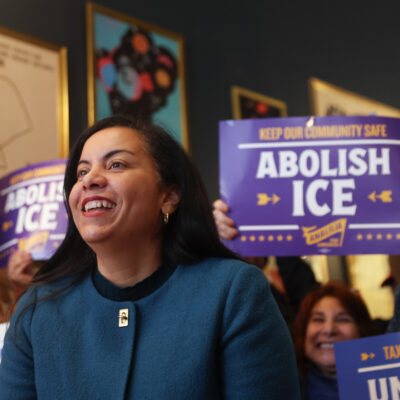
cory torpie
Money in politics is not like it once was. Will pro-Israel donors adapt?
In several key races this cycle, progressive congressional candidates have won despite often being outspent by opponents
The pro-Israel political world is facing a challenge.
Its donors have long relied on a simple and time-tested model. By bundling $2,800 checks — the maximum amount an individual can donate to a campaign — networks of like-minded contributors around the country have been able to give their preferred candidates a fundraising edge and, traditionally, a boost on the path to victory.
But a slew of key races this cycle have demonstrated that this model is not as effective as it once was. In conversations with two dozen strategists, operatives and candidates, it has become clear that the political landscape and methods of advertising have changed. And some are questioning whether pro-Israel donors have adequately adapted to the new paradigm.
Already this cycle, a number of progressive congressional candidates, including first-timers and fresh incumbents backed by Justice Democrats and other far-left political groups, have won despite often being outspent by opponents who, in many cases, had garnered significant support from the pro-Israel community.
The races underscore a nascent new reality of political campaigning as free social media attention gains a currency of its own and as grassroots strategies like canvassing, door-knocking and phone-banking have often proven more valuable than large television ad buys and other costly expenditures. And, according to some senior strategists, for the Democrats for whom it is less ideal to be seen raising big-dollar checks, some are questioning whether they can rely on grassroots donors instead.
“The advent of being able to raise funds through new methods has changed the game,” said one political strategist with longtime ties to Democratic leadership. “A candidate no longer has to exclusively fly to City A to attend a fundraiser or sit on the phone all day making one call after another. Those things still exist but the rise of the small-dollar donor has helped level the playing field.”
Hank Sheinkopf, a veteran Democratic campaign strategist, put it more bluntly: “New is working and old is generally not,” he surmised to Jewish Insider.
The latest example of this trend is the 2020 Democratic primary election in Minnesota’s 5th congressional district. According to the most recent filings from the Federal Election Commission, the main challenger to Rep. Ilhan Omar (D-MN), Antone Melton-Meaux, raised more than $4 million, in addition to over $2 million spent by independent pro-Israel groups, despite never having run for office before. Yet Omar handily won the primary last week with an 18-point margin over Melton-Meaux.
“Omar was able to compete by coming at it from a different angle,” said the Democratic strategist, who requested anonymity so he could speak freely. “She didn’t have to raise $2,800 checks at a time — $100 contributions added up.”

Antone Melton Meaux and Rep. Ilhan Omar
Another progressive candidate, Cori Bush, was also bolstered by such grassroots support. Bush — who supports the Boycott, Divestment and Sanctions movement — recently unseated a longtime incumbent, Rep. William Lacy Clay (D-MO), in a surprise upset in Missouri’s 1st congressional district, which includes parts of St. Louis and some northern suburbs.
And in New York’s June 23 primary, Jamaal Bowman, a Bronx principal backed by Justice Democrats and Rep. Alexandria Ocasio-Cortez (D-NY), dethroned longtime Rep. Eliot Engel (D-NY) in the 16th district. The senior congressman spent nearly $3 million in his latest reelection bid and was buoyed by an additional $2 million ad spend from an outside group, Democratic Majority for Israel, in the weeks leading up to the primary. But he lost to Bowman by nearly 15 percentage points.
In its television attack ad, DMFI chose to target Bowman over unpaid taxes rather than on issues relating to Israel, including Bowman’s belief that the United States should condition aid to the Jewish state. The ad was largely seen as ineffective and was even publicly rejected by Engel, the chairman of the House Foreign Affairs Committee, who avers that he is the strongest supporter of Israel in Congress.
The ad, however, may have been the least of Engel’s troubles as he went up against an opponent who was simply better versed in 21st-century campaign tactics. Bowman benefited not only from a viral hot mic gaffe courtesy of his opponent, but also from a lively and playful Twitter feed that helped familiarize him to potential voters. The 44-year-old progressive also relied on a volunteer army of canvassers to gain an edge over Engel, who was accused of being absent from the district as the coronavirus ripped through New York this past spring.
Mark Mellman, president and CEO of DMFI, defended the ad buy after Engel’s loss. In a recent interview with JI, Mellman said the original plan had been to not spend money on TV advertising in Engel’s race due to the expensive media market. “Only when it was clear [Engel] was losing and people were willing to give a lot of money, at that point were we able to say we can actually afford to be on television here and have an impact on TV,” he said.
Even if DMFI had decided to focus its attack ad on a different topic, it is unclear whether the $2 million it raised to boost Engel could have been spent better.
“The best persuasion out there is still canvassing,” said Joel Rubin, a Democratic strategist who served as director of Jewish outreach for Sen. Bernie Sanders’s (I-VT) presidential campaign.
“Money can’t buy you love. It can’t even buy you votes,” added Frank Luntz, a political pundit and Republican pollster. “And money late in the election contest is a lot less consequential than money six months earlier.”
The ways in which candidates are making their voices heard in 2020 are dramatically different from past campaigns, as the primacy of Twitter, Facebook and other services have allowed candidates to amplify their messages on the cheap rather than relying on broadcast television.
“What you used to need $300,000 to do on television you can do for $3,000 to $5,000 on social media,” said Sheinkopf.
“People aren’t watching network news anymore or local news,” Democratic strategist Stu Loeser told JI. “And when people watch TV, other than sports, they don’t watch the ads. So advertising is less important in crafting a persona. Hitting it again and again by what you say and do and think, explicitly in writing, in social media — that matters a lot.”
This is not to suggest that money — and, by extension, advertising — has no bearing on a campaign’s success, particularly in the wake of the Supreme Court’s 2010 Citizens United v. FEC ruling, which opened the floodgates on corporate spending in elections.

Cori Bush
Experts agree that candidates at least need a baseline of cash — the threshold depends on the state or district — to hire staff, perhaps conduct polling and pay for digital advertising.
“You do not need as much as your opponent, but you do need enough to be heard,” said Michael J. Malbin, co-founder and executive director of the Campaign Finance Institute in Washington, D.C., and a professor of political science in the Rockefeller College of Public Affairs and Policy at the University at Albany.
“There’s more evidence every cycle that more money isn’t making a big difference in the outcome,” said Democratic campaign strategist Joe Trippi. “Plenty of candidates with less money are beating candidates with more money.”
That was abundantly clear in New York’s 17th congressional district Democratic primary, where Adam Schleifer, the son of a biotechnology billionaire, spent nearly $5 million of his own money in the crowded race to succeed outgoing Rep. Nita Lowey (D-NY). He lost to Mondaire Jones, a 33-year-old attorney who pulled in $1.7 million, by a resounding 26 points.
Sens. Elizabeth Warren (D-MA) and Sanders both swore off big-donor fundraisers during their presidential bids but still managed to outraise their opponents. That neither candidate won is an indication that money is not the be-all and end-all it once seemed to be.
In the recent Kentucky Senate race, Amy McGrath, a 45-year-old former fighter pilot, raised a staggering $41 million but nearly lost to her progressive opponent, Charles Booker, who came within just three percentage points of pulling off what would have been a remarkable upset.
Though the surge that Booker experienced was due in no small part to grassroots momentum from the wave of racial equality protests that swept the country leading up to the June 23 primary, he also developed strong in-state support, racking up a number of local endorsements and building what one expert described as a “rainbow coalition.”
McGrath led Booker in donations — and ultimately won — but her impressive war chest was a lousy indication of voter support because many of the contributions came from outside the state, according to campaign finance experts.
“More small-dollar contributions that add up to a smaller total is more valuable than a handful of huge donations that add up to a greater total,” said Brendan Quinn, outreach and social media manager at the Center for Responsive Politics, the left-wing research group.
Candidates who rely on alternative fundraising methods may simply know how to make it count more than those who have raked in hefty sums through traditional channels.
“The progressives are spending more money on people rather than ads, and guess what, they’re winning elections,” said Sheinkopf, adding that such tactics as organizing and distributing campaign literature can help personalize a campaign and lend it more emotional depth than a quickly tossed-off TV hit.
“There’s a divide between those in the Beltway and those outside the Beltway,” he told JI, “and those outside the Beltway are spending their money more wisely than those inside.”

Mondaire Jones
DMFI’s Mellman maintained that “money still counts” in the races his group is focused on. “The difference is the people who are not pro-Israel used to not have money,” Mellman said. “Now they do, and they get it in different ways — some of them get it by aggregating small donations, some of them have larger donations. But the key reality is, both sides now have money and that’s a different world than what we used to live in.”
Jeff Mendelsohn, the executive director of Pro-Israel America (PIA), a grassroots effort to encourage smaller dollar pro-Israel donations that launched in March 2019, said he had taken the lessons of the progressive grassroots movement to heart. “We’re able to use the internet and the web effectively to reach a larger audience and to communicate effectively to people all across the country,” he told JI, noting that Pro-Israel America had built a membership base of 150,000 people who have signed petitions, written letters to Congress and made donations.
Such efforts were not enough to secure a win for Melton-Meaux, who was endorsed by the group, in Minnesota’s 5th District. In an interview with i24News late last week, PIA board chairman Jonathan Missner presented the defeat with a positive spin.
“We sent a very clear message to Congress about the strength of our community and the wide and deep support across the country for a strong U.S.-Israel relationship,” he said, “and we put anti-Israel members of Congress on notice that being an outspoken anti-Israel legislator will not be cost-free politically.”
There is no denying, of course, that being critical of Israel has come at a cost for some candidates over the years. Back in 2002, a pair of Democratic incumbents with less than stellar records on Israel — former Reps. Cynthia McKinney of Georgia and Earl Hilliard of Alabama — were defeated by challengers who had secured backing from pro-Israel donors.
Pro-Israel political groups have had to pick and choose their battles and candidates. This year, pro-Israel donors backed Teresa Leger Fernandez, who defeated Valerie Plame in New Mexico’s 3rd congressional district primary, but in Michigan did not rally around Detroit City Council President Brenda Jones, who only managed to raise approximately $165,000 in her failed effort to unseat Rep. Rashida Tlaib (D-MI) on August 4. Jones was viewed as a weak contender who had also previously praised antisemitic Nation of Islam leader Louis Farrakhan.
There may be another explanation for the success of new far-left candidates who are less friendly to the pro-Israel community. According to Loeser, they are running in one of the few lanes open for new candidates. “You can’t challenge Eliot Engel or Nita Lowey from the right,” Loeser told JI. “You have to run a more progressive campaign against them.”
If Engel had chosen to retire at the end of his term, as Lowey did, the 16th district “could have had a progressive, interesting, magnetic candidate who was not necessarily allied with people who are more skeptical of Israel,” Loeser added. Though Bowman does not support the BDS movement, he still worked with advocates who did because “the left lane was the only way you could see him win like this.”
But Loeser also noted that this does need to be the status quo. “There is a path for a magnetic, charismatic, smart, accomplished, impressive politician to run not purely from the left,” he said. “The problem is there’s just not been a lot of opportunities to prove the case yet.”
Ritchie Torres, who won his primary in the South Bronx while pulling in more than $1.7 million — the most of any candidate in the race — is one example of a progressive candidate who is proudly pro-Israel.
Martin Peretz, the longtime editor in chief of The New Republic and a Democratic donor who supports pro-Israel causes, gave $1,500 to Torres’s campaign and helped raise money on the candidate’s behalf. “He really is our guy,” said Peretz, who believes that political donations helped Torres emerge victorious. “The money did make a difference.”
But even without the money he raised, Torres, a gay, Afro-Latino city councilman with a compelling personal story, was in a solid position to endear himself to voters in the district.
And in the end, you can’t slap a price tag on that.
“The candidate still really matters,” said Trippi. “Somebody with less money but a more powerful message can beat a weak message with millions and millions of dollars.”
Please log in if you already have a subscription, or subscribe to access the latest updates.






